
The Naughty Bits
What the Censors Wouldn’t Let You See in Hollywood’s Most Famous Movies
No se pudo agregar al carrito
Add to Cart failed.
Error al Agregar a Lista de Deseos.
Error al eliminar de la lista de deseos.
Error al añadir a tu biblioteca
Error al seguir el podcast
Error al dejar de seguir el podcast
Prueba gratis de 30 días de Audible Standard
Compra ahora por $17.11
-
Narrado por:
-
Nat Segaloff
-
De:
-
Nat Segaloff
Between 1934 and 1968, no Hollywood studio could make a movie without the permission of, and a seal of approval from, the Production Code Administration. Formed in 1930 but not enforced until 1934, the Production Code was Hollywood’s official censorship system. Screenplays, books, plays, costumes, and even story ideas and song lyrics had to be cleared by the Code before they could be filmed, and Code staffers watched at every stage of the production process to ensure compliance. The correspondence between the Code and the studios was confidential, and the memos within the Code office itself were even more so.
Well, not anymore. The Naughty Bits pores through those files to show how the censors did their job and yields some surprising results. What was the world prevented from seeing in some of the greatest movies ever made as well as some of the most scurrilous? Here is the sometimes funny, sometimes outrageous, always riveting history of movie censorship revealed in letters, notes, and tantrums on both sides of the screen.
The audiobook is read by author Nat Segaloff. It is edited slightly from the print edition published by Sticking Place Books. It necessarily contains dated language and ideas that some listeners may find offensive.
©2024 Nat Segaloff (P)2024 Nat SegaloffLos oyentes también disfrutaron:


Las personas que vieron esto también vieron:

The depth of research
Se ha producido un error. Vuelve a intentarlo dentro de unos minutos.


